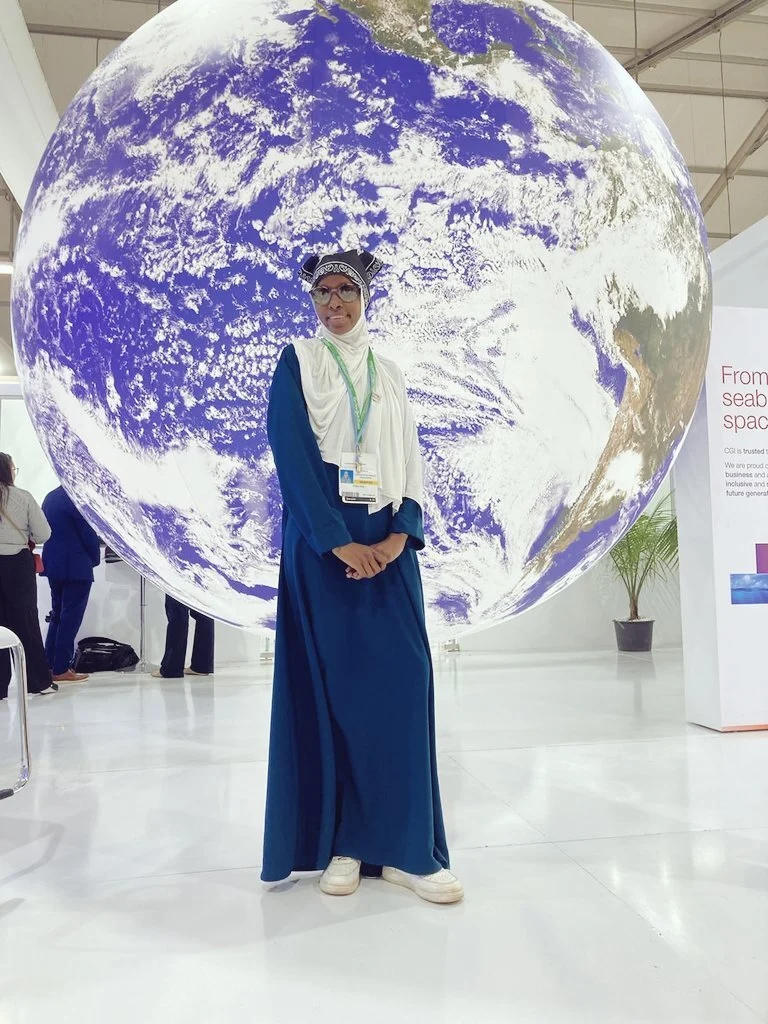CLIMATE CAPITAL
Rukia Ahmed Champions Climate Action and Sustainability in Kenya
Fueled by her passion, Rukia Ahmed established the Green North Eastern Initiative, a community organization focused on enhancing climate resilience in northern Kenya. “I collaborate with schools to plant trees alongside teachers and students. “We began in Wajir County and have since expanded to Mandera and Garissa, where we’ve planted nearly 10,000 trees,” she explains.

: At just 21, Rukia Ahmed is a climate justice activist reshaping the environmental narrative in northern Kenya. Drawing from her experiences in Wajir and her education in Nairobi, she promotes sustainability and community resilience through her Green North Eastern Initiative. Rukia leads tree-planting efforts and advocates for accountability in climate action, emphasizing the urgent need to address the disproportionate impacts of climate change on vulnerable communities. Join her mission for a sustainable future in northern Kenya.
By Barack Oduor
When Rukia Ahmed first arrived in Nairobi from Wajir, she was immediately struck by the stark difference in weather. Growing up in Wajir, the harsh climate often disrupted daily life, making even attending afternoon classes a challenge. Now, at 21, Rukia is a climate justice activist on a bold mission to change the environmental narrative of northern Kenya.
Rukia’s educational journey took her from Islamic Call Foundation Primary School in Wajir to Our Lady of Mercy Girls Secondary School in Shauri Moyo, Nairobi, in 2021. It was during this transition that she discovered her passion for advocating for a healthier, more sustainable environment.
“When I came to Nairobi for my secondary education, I saw a huge difference in the environment. In Form Two, I attended a climate conference at the Catholic University of Eastern Africa, and that’s when I realized there was something I could do for my community,” recalls Rukia.
She began by planting trees in Wajir during school holidays, but soon recognized that the region’s problems required more than just reforestation. Northern Kenya, she learned, was grappling with the severe impacts of climate change.
“Northern Kenya frequently suffers from drought, leading to massive livestock deaths, which devastates pastoralist communities that rely on livestock for their livelihoods. This results in malnutrition for children, women walking miles to find water, and families rationing meals to cope with food insecurity,” explains Rukia.
Other challenges—including marginalization, poverty, weak institutions, poor infrastructure, lack of information, limited access to financial services, and resource-based conflicts—compound the difficulties faced by northern Kenya in dealing with climate change.
Holding the Powerful Accountable
For Rukia, climate justice means ensuring that those responsible for environmental degradation are held accountable, while those affected receive the support they need to adapt and mitigate the effects. “In many areas, when it rains, floods destroy homes and cause disease, death, and crop failure. The people affected by this deserve justice,” she says.
Now pursuing a Bachelor of Education degree at Mt. Kenya University, majoring in Mathematics and Biology, Rukia leads tree-planting drives across northern Kenya and actively speaks on climate justice. She views the climate crisis as a human tragedy, pointing out that while Africa contributes very little to global emissions, it suffers disproportionately from climate change’s effects.
“Africa is the second-largest continent but contributes less than four percent to global emissions, with almost no historical emissions. Yet, we are among the hardest hit by climate change,” she notes, citing data from the International Energy Agency.
Rukia’s activism has earned her opportunities to volunteer with various organizations, leading to her participation in the 2022 United Nations Climate Change Conference (COP27) in Sharm El Sheikh, Egypt. She also attended the Climate Justice Camp hosted by Greenpeace International in Nabeul, Tunisia.
Driven by her passion, Rukia founded the Green North Eastern Initiative, a community-based organization aimed at building climate resilience in the northern frontier. “I partner with schools to plant trees with the help of teachers and students. We started in Wajir County, and now we’ve expanded to Mandera and Garissa, where nearly 10,000 trees have been planted,” she says.
A Call for Renewable Energy
Rukia is deeply concerned about the drastic changes in weather patterns in northeastern Kenya, which threaten livelihoods, particularly for farmers dependent on rain-fed agriculture. She calls for a transition from fossil fuel-based energy systems to more sustainable alternatives like wind and solar power.
“Our failure to implement policies and regulations that hold companies and governments accountable for emissions has made action more urgent than ever,” says Rukia.
Without decisive intervention, she warns, climate change will reverse Kenya’s progress in poverty reduction and deepen economic and social inequalities. Rukia’s activism is especially timely as women in Kenya, often the most vulnerable to climate change, are increasingly bearing the brunt of its effects.
As Rukia continues her mission, she hopes her efforts will not only transform northern Kenya but also inspire others to fight for a more just and sustainable future for all.
Keywords:Rukia Ahmed:Climate Activism:Northern Kenya:Tree Planting Initiative:Sustainable Environment
NB:First published in the Eastleigh Voice
Celebrities & Sports
Bien Aime Baraza: Kenya’s Top Spotify Artist of 2024
Bien’s music blends heartfelt lyrics with vibrant African rhythms, creating a powerful emotional connection with listeners. His hit single Inauma deeply resonated with fans, addressing themes of heartbreak and resilience, while showcasing his ability to craft compelling, introspective narratives. This track, like much of his work, blends raw emotion with the energy of African musical traditions, making it a standout in his catalog.

: Bien Aime Baraza, top Spotify artist in Kenya 2024, stands out with his soulful R&B sound and solo career success. Discover his journey and music evolution.
Bien-Aimé Baraza, widely known as Bien, has redefined the Kenyan music landscape with his soulful sound and captivating storytelling.
Crowned Spotify’s top artist in Kenya for 2024, his music spans genres, blending Afropop, R&B, and Afro-soul, making him a standout both locally and internationally.
EARLY CAREER AND RISE TO STARDOM
Bien’s music journey began at Upper Hill High School, where he formed Sauti Sol in 2006 with Savara Mudigi, Polycarp Otieno, and Willis Chimano.
The group initially sang a cappella before evolving into a multi-award-winning band. Reflecting on those formative years, Bien said, “We started as a bunch of boys who just loved to sing. We had no idea it would grow into this phenomenon”.
His passion for music was further nurtured during his studies at the United States International University, where he pursued Journalism and Media Studies.
His storytelling abilities became central to his lyrical style, characterised by emotive narratives and catchy melodies.
BREAKING AWAY FROM SAUTI SOL
In 2021, Bien began exploring solo projects while remaining part of Sauti Sol. In 2023, the band announced a “temporary separation,” explaining that they wanted to pursue individual growth.
Bien remarked, “This isn’t the end of Sauti Sol; it’s an opportunity to rediscover ourselves and bring something fresh to the table.” This independence allowed Bien to delve deeper into personal projects, which included collaborations like Bald Men Love Better with Aaron Rimbui.
MUSICAL STYLE AND LATEST PROJECTS
Bien’s music combines a mix of poignant lyrics and vibrant African rhythms. His hit single Inauma resonated deeply with fans, tackling heartbreak and resilience.
In 2024, his COLORSxSTUDIOS performance of True Love further showcased his ability to bring raw emotion and soul to his music. Speaking about his craft, he said, “Music is therapy for me; it’s how I make sense of the world and connect with my fans”
WHAT SETS BEIN APART
What makes Bien unique is his authenticity and ability to address universal themes while rooted in African culture. Unlike many local artists, Bien often experiments with sound and visuals, as seen in his COLORSxSTUDIOS performance.
His willingness to collaborate with international platforms and artists highlights his global vision for Kenyan music.
LEGACY AND IMPACT
Bien continues to inspire, proving that Kenyan artists can excel on the world stage. As Monica Kemoli-Savanne from Spotify noted, “Bien’s success is a testament to the power of African talent and storytelling”.
Whether with Sauti Sol or as a solo artist, Bien remains a force in music, bridging cultures and redefining the African sound for global audiences
Startups & Funding
Top 10 Richest East Africans Under 30: Industries & Net Worth

: Discover the top 10 wealthiest East Africans under 30, their industries,
achievements, and estimated net worths. Learn about their remarkable journeys
to success.”

Kenneth M. Njeru (25, Kenya)
- Engagement: Founder of Africa Afya Healthcare, focusing on healthcare investment services and IT solutions for healthcare access improvement.
- Industry: Healthtech and healthcare investment.
- Net Worth: Not publicly disclosed but prominent in healthcare financing in Kenya

Ayushi Chandaria (26, Kenya)
- Engagement: Founder of Design Thinking Program, fostering innovation in education.
- Industry: Education and innovation.
- Net Worth: Not publicly disclosed but recognized for her impactful work in Kenya

Alex Mativo (29, Kenya)
- Engagement: Co-founder of E-LAB, Nanasi, and Duck, leveraging technology in multiple sectors.
- Industry: Technology and entrepreneurship.
- Net Worth: Estimated at several million USD due to diversified ventures
- .

Prisca Wegesa Magori (29, Tanzania)
- Engagement: CEO and Co-founder of TenTen Explore and Smart EFD, providing innovative software solutions.
- Industry: Technology and software development.
- Net Worth: Undisclosed but influential in Tanzania’s tech scene

Andrew Ddembe (28, Uganda)
- Engagement: Co-founder and CEO of MobiKlinic, providing mobile-based healthcare solutions.
- Industry: Healthtech.
- Net Worth: Not disclosed but a key figure in Uganda’s health innovation

Arooj Sheikh (28, Kenya)
- Engagement: Founder and CEO of Beyond Kenyan Bars, working on social justice initiatives.
- Industry: Social entrepreneurship.
- Net Worth: Undisclosed, focusing on impactful social change
- .

Hildah Magaia (29, Tanzania/South Africa)
- Engagement: Professional footballer for Mazatlán FC and Tanzania’s national team.
- Industry: Sports.
- Net Worth: Significant from sports and endorsements

Chad Jones (28, Kenya/South Africa)
- Engagement: Social media influencer and brand ambassador.
- Industry: Digital media and marketing.
- Net Worth: Not disclosed but has significant brand partnerships
These individuals have demonstrated remarkable entrepreneurship and talent across East Africa, contributing to industries like health, technology, education, sports, and tourism.
CLIMATE CAPITAL
Access Bank Secures CAK Approval for National Bank Acquisition

: Access Bank to acquire National Bank of Kenya for $100M, boosting market
share to 1.9% with CAK approval and workforce retention conditions.
CAK Approves Access Bank’s Acquisition of NBK with Conditions
The Competition Authority of Kenya (CAK) approved Access Bank’s acquisition of the
National Bank of Kenya (NBK) from KCB Group, requiring Access Bank to retain 80% of
NBK’s workforce for at least one year.
The Central Bank of Kenya (CBK) must now give its final approval for the deal.
Employment Retention Key to Approval
According to CAK, Access Bank must maintain 80% of NBK’s 1,384 employees and all
316 staff from its local subsidiary, Access Bank Kenya, for a year following the
transaction’s completion. “The transaction has been approved on condition that Access
Bank Plc retains, for one year, at least 80% of the target’s current workforce,” CAK
stated.
Deal Valuation and Finalization Timeline
While the deal’s value has not been disclosed, KCB Group announced in March 2024
that NBK would be sold for 1.25 times its book value. With NBK’s 2023 book value at
$79.77 million, the acquisition is estimated to be worth approximately $100 million. The
transaction is expected to conclude in November.
Expanding Access Bank’s Kenyan Presence
Access Bank’s current footprint in Kenya includes 23 branches in 12 counties. Acquiring
NBK’s 77 branches across 28 counties will significantly boost its presence and service
offerings, including retail, corporate, and Islamic banking. Access Bank, currently
ranked as a tier 3 lender, will integrate with NBK, a tier 2 institution, enhancing its status
in the market.
Market Share and Competition Analysis
The acquisition will give the merged entity a 1.9% market share in Kenya’s banking
sector. “The combined market size is unlikely to raise competition concerns since it is
low,” CAK noted. “The merged entity will face competition from other banks in the
market. Based on this, the transaction is unlikely to substantially lessen or prevent
competition.”
-

 Politics5 months ago
Politics5 months agoFred Okengo Matiang’i vs. President William Ruto: A 2027 Election Showdown
-

 Business & Money10 months ago
Business & Money10 months agoEquity Group Announces Kshs 15.1 Billion Dividend Amid Strong Performance
-

 Politics4 months ago
Politics4 months agoIchung’wah Faces Mt. Kenya Backlash Over Gachagua Impeachment Support
-

 Politics7 months ago
Politics7 months agoPresident Ruto’s Bold Cabinet Dismissal Sparks Hope for Change
-

 Politics7 months ago
Politics7 months agoPresident Ruto’s Lavish Spending Amid Kenya’s Economic Struggles Sparks Outrage
-

 Politics6 months ago
Politics6 months agoJohn Mbadi Takes Over Kenya’s Treasury: Challenges Ahead
-

 Business & Money2 months ago
Business & Money2 months agoMeet Kariuki Ngari: Standard Chartered Bank’s new CEO of Africa. What’s Next?
-

 Politics7 months ago
Politics7 months agoKenya Grapples with Investor Confidence Crisis Amid Tax Protest Fallout





